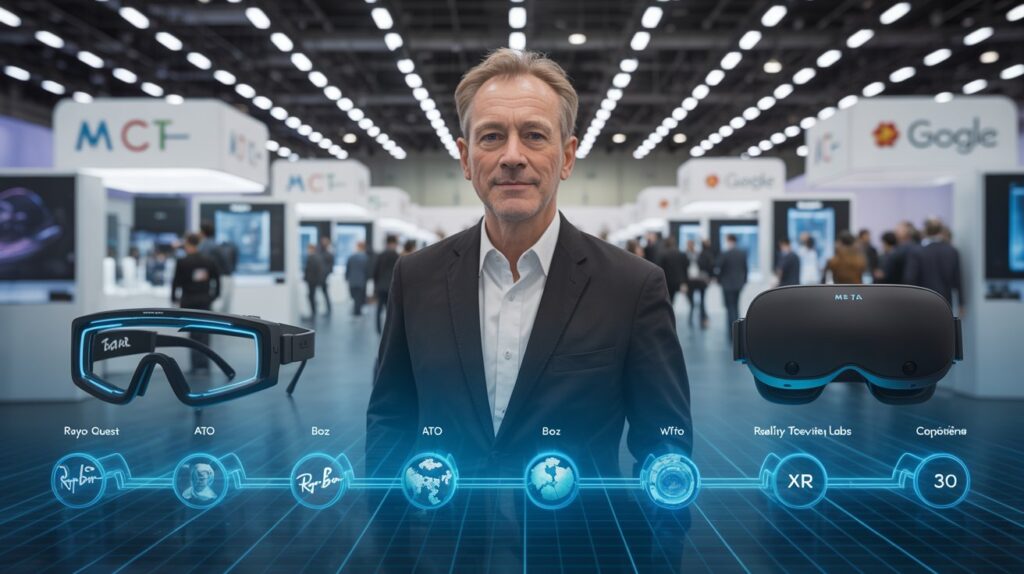
TL;DR
- Meta CTO Andrew Bosworth says 2025 is a “pivotal year” for AR/VR.
- Meta has sold over 2 million Ray-Ban smart glasses since launch.
- Competition from Google and Apple is accelerating in the XR space.
- Success hinges on market adoption, not just innovation.
- Execution, not competition, is Meta’s internal focus for the year.
Meta’s Boz Declares 2025 a Make-or-Break Year for AR and VR Ambitions
Meta’s top engineer believes the company’s multi-billion-dollar bet on the metaverse could finally prove its worth in 2025—or unravel into what he calls a “legendary misadventure.”
Andrew “Boz” Bosworth, Meta’s Chief Technology Officer and longtime executive, said in a recent Bloomberg Technology interview that this year marks a decisive inflection point for the company’s Reality Labs division, which leads its augmented and virtual reality initiatives.
“We’ll judge at the end of the decade, but this does feel like the pivotal year,” Boz said, emphasizing both cautious optimism and the high stakes ahead.
Meta’s journey into immersive computing has been long and costly, with Reality Labs losing over $45 billion since 2019. Yet Boz insists that 2025 could be the year when that investment begins to pay off—or not.
Smart Glasses Gain Early Traction
One product showing real traction is Meta’s Ray-Ban smart glasses, launched in October 2023 in partnership with EssilorLuxottica. As of February 2025, Meta has sold over 2 million pairs, a milestone that surprised analysts.
In fact, Boz noted that the AI-powered glasses have outpaced traditional Ray-Ban styles in some retail channels. This occurred even before the rollout of new AI features, such as hands-free Instagram livestreaming, AI-powered object recognition, and real-time translation.
XR Device Adoption Milestones
| Device | Launch Date | Units Sold (Est.) | Notable Features |
| Ray-Ban Meta Smart Glasses | Oct 2023 | 2M+ | AI assistant, camera, voice commands |
| Meta Quest 3 | Oct 2023 | 4M+ | Mixed reality, hand tracking, passthrough |
| Apple Vision Pro (est.) | 2026 | TBD | Eye tracking, spatial computing |
| Google Android XR glasses | TBA | TBD | Built via partnerships |
Meta IR, Counterpoint Research, Bloomberg
Competitive Pressures Mount
The smart glasses category is getting more crowded. In May 2025, Google announced partnerships with fashion eyewear brands Gentle Monster and Warby Parker to create Android-based smart glasses with XR capabilities. Meanwhile, Apple is rumored to be developing its own AR glasses for release in 2026.
For Meta, which has often been perceived as trailing in consumer hardware, these developments signal both validation and urgency.
“The clock has started on competition coming,” said Boz. “That just means that the progress we make this year is of disproportionate value.”
Execution Over Hype
Despite the competitive race heating up, Boz emphasized that Meta’s success won’t be determined by what Apple or Google does—but whether Meta itself delivers on its own ambitious roadmap.
“Sheryl used to always talk about how most companies don’t fail because they got beaten by a competitor,” Boz said. “Most companies fail because they didn’t execute their own plan correctly.”
That mindset now anchors Meta’s internal operations, Boz said. The company is focused less on headlines and more on fulfilling the benchmarks laid out by Reality Labs for 2025.
“What we’ll know by the end of the year is whether we executed on our plan or not,” Boz added. “What we’ll know in five years’ time is whether that was enough.”
Market Adoption Remains Elusive
Boz was clear-eyed about the fact that product innovation alone won’t drive success—mass-market adoption will be the true test. In his words, the hardware market tends to be a “trailing indicator.”
This means that even if a product is technically revolutionary, consumer interest, usage, and willingness to pay remain the ultimate filter.
That said, Boz believes early indicators for Meta’s hardware ecosystem are positive. With the combination of Ray-Ban smart glasses, Meta Quest 3, and upcoming AI features embedded in devices, the company is building what he calls a “minimum viable stack” for ambient computing.
Financial Risks Continue to Mount
While the promise of Meta’s XR efforts is growing, the financial pressure is too. Reality Labs’ losses exceeded $16 billion in 2024, and the company has projected similar losses for 2025. Investors remain skeptical about whether AR/VR can become a sustainable business unit.
Despite skepticism, Meta CEO Mark Zuckerberg remains committed. During Meta’s Q1 2025 earnings call, he described Reality Labs as a “once-in-a-generation bet” on computing platforms that may define the next 20 years.
“It’s very easy to write off what we’re doing as some science-fiction thing,” Boz told Bloomberg. “But there’s a path to commercial scale here.”
2025 Roadmap: What’s Coming
Meta’s roadmap for 2025 includes the following key milestones:
- Ray-Ban AI 2.0 Launch: A new version with upgraded AI and longer battery life.
- Quest OS Expansion: Making the operating system behind Quest available to third-party headset makers.
- Horizon OS Improvements: Integration of more productivity and collaboration features into Meta’s metaverse platform.
- Full SDK for Meta AI: Allowing third-party developers to embed Meta’s generative AI into XR apps.
If these pieces come together, 2025 could set the foundation for Meta’s long-term XR vision.
The Verdict Comes Later
Boz admits that 2025 alone won’t decide everything. But it will define whether Meta’s XR ambitions are gaining real traction—or merely burning through cash and attention.
In his words: “This is the year we find out if we’re on the right path. The market will tell us.”
For now, the company is executing on a focused vision. The results—adoption, satisfaction, and revenue—will follow, or they won’t. And that will determine whether Meta’s metaverse era is remembered as brilliance—or bravado.



